Heartburn is another term for chest pain caused by the rise of stomach acid traveling up the throat - this phenomenon is also called reflux. If this happens repeatedly, it is called gastroesophageal reflux disease (GERD).
HEARTBALL: What is Heartburn? | Symptoms of Heartburn | A visit to the doctor | Causes of a cold | Diagnostics | Heartburn TREATMENT | Conventional treatment | Alternative Methods | Main causative agents | Prevention | Questions and Answers | Sources/references
Heartburn is a burning, unpleasant sensation in the chest area. But in reality, this feeling does not occur in the area of the heart (the English word for Heartburn is Heartburn). Instead, Heartburn or reflux results from stomach acid rising into the esophagus, which passes through the chest near the heart.
Heartburn is often worse after eating, in the evening, or when lying down or bending over. However, occasional Heartburn is common and not a cause for alarm, as most people can manage it independently with lifestyle changes and occasional over-the-counter medications.
If Heartburn persists for a long time, it can develop into GERD (gastroesophageal reflux disease).
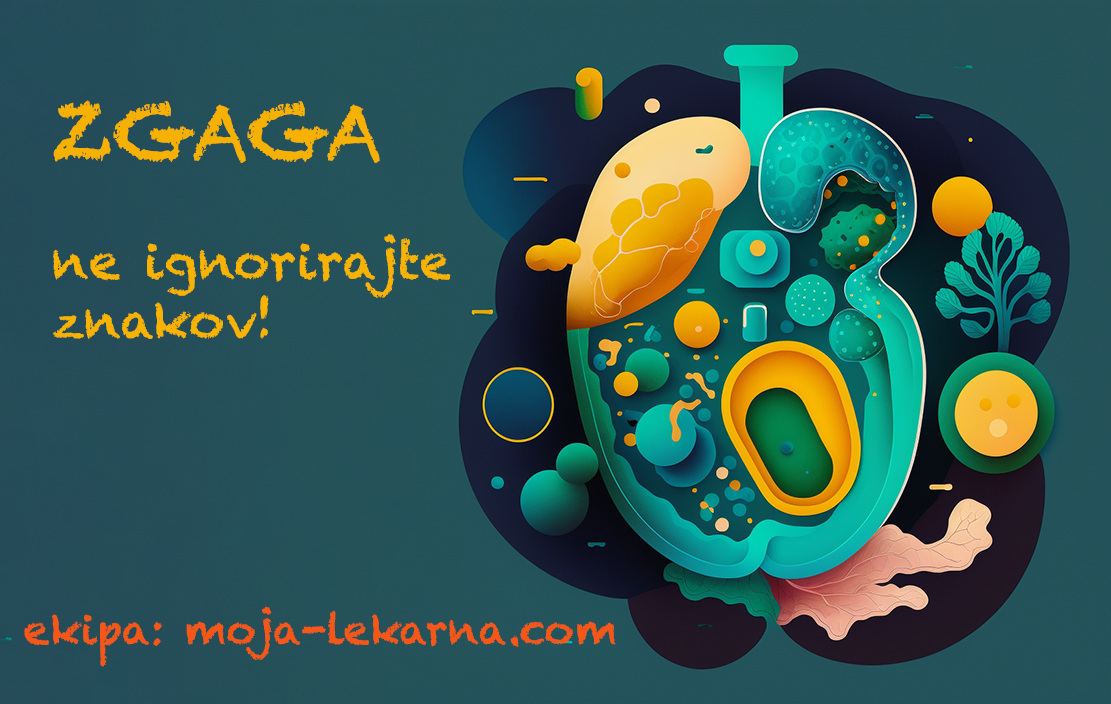
Heartburn affects many individuals. It can be triggered by a very fatty or acidic meal and increased abdominal pressure that can occur during pregnancy. Obesity (a BMI greater than 30), smoking, and being around second-hand smoke are risk factors.
Heartburn is caused by irritation of the lining of the esophagus caused by stomach acid. With the help of gravity, the lower esophageal sphincter keeps stomach acid in the stomach. It is located where the esophagus passes into the stomach - under the ribs and a little to the left of the middle. It usually opens to allow food to pass into the stomach or, when vomiting, then closes again. If it opens too often or too far, stomach acid can return to the esophagus and cause burning pain.
Video Content: Heartburn and Acid Reflux and GERD

It is not dangerous if you get occasional Heartburn, but chronic Heartburn can be a sign of a severe illness. It is estimated that Heartburn is a daily occurrence in 10% of all people and 50% of pregnant women. In addition, he occasionally harasses an additional 30% of people.
How do we recognize Heartburn?
The difference between Heartburn and other forms of chest discomfort can be difficult to tell. Therefore, discussing your pain with a doctor or specialist is always a good idea if you do not know the problem.
It can also be helpful to be aware of any other symptoms. Then, based on these comorbid symptoms, you can distinguish Heartburn from a heart attack or other esophagus diseases.
Symptoms of Heartburn
- A burning sensation in the chest, precisely behind the sternum, occurs after eating and lasts a few minutes or several hours.
- Chest pain, especially when bending or lying down.
Video content: Heartburn - causes, symptoms, and more.

- Burning sensation in the throat - or hot, sour, or salty liquid in the back of the throat.
- Sleeping.
If your Heartburn is caused by acid reflux, you may also be experiencing the following:
- burping
- sour taste in the mouth
- weakness
- regurgitation of food
Other atypical symptoms of acid reflux include:
- bloating and fullness of the stomach
- hiccup
- chronic cough
- worsening of asthma
- sore throat
- laryngitis
- difficulty swallowing or feeling a lump in the throat
- angina-like chest pain (non-cardiac chest pain)
GERD (gastroesophageal reflux disease)
GastroenterologyOesophageal reflux disease, also known as chronic acid reflux, is a disorder in which stomach contents containing acid often (too often) enter the esophagus.
Heartburn occurs because the valve at the end of the esophagus, the lower esophageal sphincter, does not close properly when food reaches the stomach. As a result, acid reflux flows back through the esophagus into the throat and mouth, causing a sour taste, also acid pH damage.
It is very natural to experience Heartburn and acid reflux occasionally. However, suppose these conditions occur more than twice a week over several weeks. In that case, you regularly use antacids and Heartburn medications, but you may have GERD if the symptoms still recur.
Video content: more about GERD.

A doctor should treat GERD to eliminate the symptoms because it can trigger more severe health problems.
When to see a doctor?
Consult your doctor if:
- You have Heartburn accompanied by: difficulty swallowing, difficulty breathing, sweating, dizziness, vomiting, diarrhea, severe abdominal pain, fever, or bloody or black stools. In addition, you may have a hiatal hernia, inflammation of the pancreas, gastritis, stomach ulcer, or cancer, and you may also have a heart attack. Call the doctor immediately!
- You take an antacid for relief, and it doesn't go away within 15 minutes. Such symptoms can also be a sign of a heart attack. Call the doctor immediately!
- Heartburn worsens with movement and improves at rest. You may have heart disease.
- You have chronic Heartburn (every or almost every day). Stomach acid causes frequent burns in the esophagus, leading to esophagitis (inflammation of the esophagus), scarring, stomach ulcers, or cancer.
Make an appointment with your doctor if:
- heartburn occurs more than twice a week
- symptoms persist despite the use of over-the-counter medications
- you have trouble swallowing
- suffer from persistent nausea or vomiting
- you are losing weight due to poor appetite or eating problems
CAUSES
The leading cause of Heartburn is the poor functioning of the lower esophageal sphincter, which does not seal as it should. Double overeating also helps with too much food in the stomach (too big a meal) and too much pressure on the stomach (often with obesity or pregnancy).
Video Content: What Causes Heartburn?

Certain types of food release the lower esophageal sphincter, e.g., tomatoes, citrus fruits, garlic, onions, chocolate, coffee, alcohol, and peppermint. In addition, Heartburn is often caused by foods rich in fats and oils (animal and vegetable), certain medications, especially antibiotics and acetylsalicylic acid (aspirin), and stress, which irritates the nerves that control the lower esophageal sphincter.
WARNING
Antacids can mask or worsen heartburn problems. Do not take antacids without consulting your doctor if you have high blood pressure, irregular heartbeat, kidney disease, chronic constipation, diarrhea, colitis, gastrointestinal bleeding, or signs of appendicitis. In addition, pregnant and lactating women should consult a doctor before using any medication, including antacids.
Smoking also contributes a lot, which relaxes the lower esophageal sphincter and stimulates stomach acid secretion.
Diagnostics - making a diagnosis
Prolonged Heartburn can be a sign of gastroesophageal reflux disease (GERD). Your doctor may be able to determine if GERD is the cause of your Heartburn based on your symptoms.
Your description of symptoms may be enough for the doctor, but sometimes additional tests are needed. For example, the esophagus can be examined with an endoscope, a long, thin, flexible tube inserted through the mouth, or X-rays. In addition, he may take an EKG to determine if the heart is the cause of the problem.
HEALING
Most doctors prescribe antacids for occasional Heartburn. Alternative medicine relies on acid-reducing herbs and relaxation techniques that reduce stress.
CONVENTIONAL MEDICINE
The most important thing is to identify the cause of Heartburn so that you can avoid it in the future. Over-the-counter antacids or bismuth subsalicylate are often prescribed to neutralize stomach acid.
Video Content: Reflux Treatment and Home Remedies.

Suppose you cannot manage the problems with antacids. In that case, your doctor may prescribe cimetidine, ranitidine, or omeprazole, which reduces acid formation in the stomach, or cisapride or metoclopramide, which accelerates the emptying of the stomach. If all else fails, the lower esophageal sphincter may need to be surgically repaired, but this is rarely necessary.
The doctor may perform several tests, including:
- X-ray: You will drink a barium suspension solution that coats the lining of the upper part of the gastrointestinal (GI) tract – the esophagus, stomach, and upper part of the small intestine. This coating allows doctors to see defects that could indicate problems in your digestive system.
- Endoscopy: A tiny camera on a flexible tube is inserted into the throat to visualize the upper part of the digestive tract.
- Ambulatory acid probe test (esophageal pH monitoring): Occasionally, your doctor may recommend a 24-hour esophageal pH probe, especially if you have atypical symptoms such as chest, abdominal, or throat pain, cough, or asthma-like symptoms.
- Esophageal motility testing (esophageal manometry): A catheter is inserted into your esophagus and measures pressure and movement.
- Electrocardiogram (ECG): To determine if your heart is the cause of your symptoms, you may want to have an EKG, a recording of the heart's electrical activity.
How to treat and eliminate Heartburn?
OTC medications and lifestyle changes can be used to help manage occasional Heartburn. However, you may need prescription medication if you experience frequent Heartburn.
These medications, therefore, reduce the amount of stomach acid that enters your esophagus. However, they do not address the underlying cause of lower esophageal sphincter dysfunction. Therefore, you may need additional treatment if the medication does not help.
Medicines for Heartburn include:
- Antacids: these neutralize your stomach acid so that it is no longer corrosive to your esophagus. They often contain ingredients that can also treat other symptoms. For example, Simethicone can help with gas, and magnesium can help relieve mild constipation.
- Alginates: these are naturally occurring sugars derived from seaweed. They help block acid reflux by floating on top of the acid and creating a physical barrier between the acid and your esophagus.
Video content: how to treat Heartburn and reflux?

- Histamine receptor antagonists (H2 blockers) reduce the production of stomach acid by blocking the chemical that signals the body to produce it (histamines). Some H2 blockers are available over the counter, and some only have a prescription.
- Proton pump inhibitors (PPIs) are more potent acid blockers that promote tissue healing. Your doctor may prescribe them as a first-line treatment if your Heartburn is severe or you have signs of tissue damage in your esophagus. They are 90% effective in reducing acid reflux. In addition, if you have esophageal ulcers, these are the only medications that help heal them.
ALTERNATIVE MODES
For other treatments, see the keyword Hiatus-sna Hernia, a condition often associated with Heartburn.
CHINESE HERBS
Heartburn can be relieved by tea made from 10 g of orange peels, four slices of fresh ginger (Zingiber officinale), 10 g of Poria (Poria cocos), 10 g of Agastache (Agastache rugosa), and 3 g of Ural licorice (Glycyrrhiza uralensis); drink one or two cups. If you don't feel better, call your doctor.
THE MYTH OF MILK
Milk is not a cure for Heartburn. The feeling of relief when you drink milk is deceiving; when milk enters the stomach, milk fat, calcium, and protein accelerate the production of acid, which worsens Heartburn. Mint is also said to relieve Heartburn, but it doesn't: mint relaxes the lower esophageal sphincter, which allows acid to enter the esophagus and cause Heartburn.
This mixture should not be consumed every day.
HERBS
Heartburn symptoms are quickly relieved by ginger tea (Zin-giber officinale). Likewise, chamomile tea (Matricaria recut-ta) is soothing and valuable for Heartburn caused by stress.
HOMEOPATHY
The typical symptoms of Heartburn usually respond well to homeopathic remedies. For example, if you have eaten spicy food, take nux vomica; after rich food, carbo vegetabilis; in burning pain, Arsenicum album. The dose is 6C; take it every 15 minutes; repeat it thrice. You can repeat the same if necessary.
What are the leading causes of Heartburn?
Many people suffer from Heartburn from time to time. However, often there is no apparent reason for its formation.
Sometimes they cause or worsen it:
- certain foods and drinks – such as coffee, tomatoes, alcohol, chocolate, and fatty or spicy foods
- excess body weight
- smoking
Video content: The worst food to eat for reflux.

- pregnancy
- stress and anxiety
- increase in certain types of hormones, such as progesterone and estrogen
- certain medicines such as anti-inflammatory pain relievers (such as ibuprofen)
- hiatus hernia – when part of the abdomen moves up into the chest
PREVENTION
You can prevent Heartburn. The key to success is maintaining average weight, avoiding foods that cause stomach acid to back up into the esophagus (see Causes, left), getting enough rest and exercise, and keeping stress to a minimum.
Video content: Reflux treatment at home

If you need to lie down after eating, lie on your left side; in this position, the stomach is lower than the esophagus.
Questions and Answers
How to successfully stop Heartburn?
The options are as follows:
- Antacids help to neutralize stomach acid. Antacids usually provide quick relief...
- H2 blockers can reduce the production of stomach acid. H2 blockers do not work as quickly as antacids but may provide longer-lasting relief...
- Proton pump inhibitors reduce the production of stomach acid[1].
What does Heartburn feel like?
Typical symptoms of Heartburn include a burning sensation in the chest that may also involve the upper abdomen. It usually occurs after eating or while lying down or bending over. It can wake you up from sleep, mainly if you ate up to two hours ago[2].
How do I know if it is Heartburn?
Symptoms of Heartburn include burning pain in the chest that usually occurs after eating and may also occur at night. Pain that gets worse when you lie down or bend over. A bitter or sour taste in the mouth is significant[3].
Sources and references
Source: Family Health Guide. Conventional and alternative treatment, Dr. Jaro Lajovic, Publishing House Mladinska knjiga
1. Heartburn - https://www.mayoclinic.org
2. Heartburn or heart attack: When to worry - https://www.mayoclinic.org
3. Heartburn - https://www.mayoclinic.org






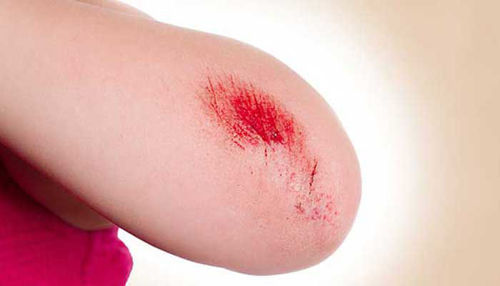
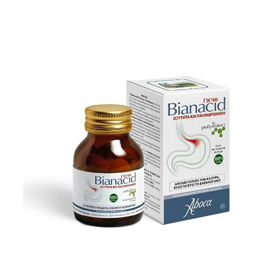

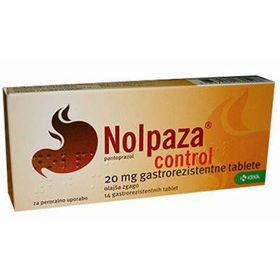
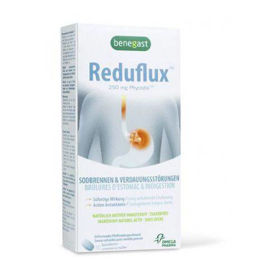

 Facebook
Facebook
 Instagram
Instagram
 info@moja-lekarna.com
info@moja-lekarna.com

